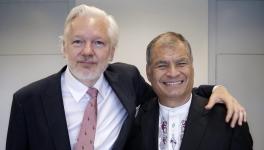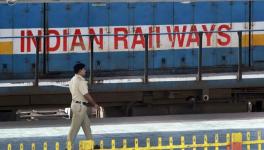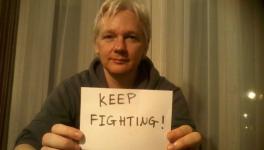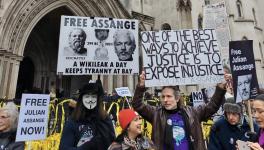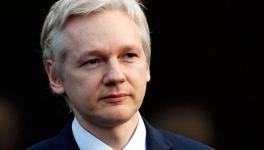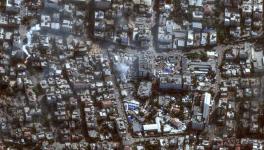In My Own Voice: Journalists Under Attack
Image Courtesy : Twitter/Nimisha Jaiswal
Julian Assange, the founder and editor in-chief of WikiLeaks, famous for having leaked documents regarding the U.S government’s grave military and political misadventures in Iraq and Afghanistan, has lost his asylum. US President Donald Trump succeeded in having him extradited and as a literary symbol of communication, Assange was seen carrying a copy of Gore Vidal’s ‘History of The National Security State’ for the benefit of photographers.
Meanwhile, several journalists and public intellectuals, N. Ram, Romila Thapar, Gopalkrishan Gandhi and P.Sainath, among others, have in a statement said, “his arrest, and the attempt to extradite him to the U.S are clearly, attacks on the freedom of the press and its right to publish”.
Ram was earlier in the forefront of a rapacious attack on press freedom by the Attorney General of India who termed the documents regarding the Rafale deal – which included a note from the Ministry of Defence complaining of parallel negotiations from the Prime Minister’s office – as ‘stolen’. Ram spoke with the integrity that emanates from a lifetime of standing for the freedom of the press when he responded, “You may call them stolen documents, but they speak for themselves.”
It seems George Orwell’s 1984 has come to life -- Big Brother has all your private data and can use it any time for anything, against you. With Aadhaar, your data is with the government and the hapless citizen is pushed to get one – for instance, when a journalist lost her husband, she was asked to provide his Aadhaar card in order to obtain his death certificate.
Private companies like Facebook sell our data with impunity, as was revealed in the Cambridge Analytica revelations, which in effect can be used to manipulate elections. However, when an intrepid journalist seeks to investigate and reveal in public interest, they are charged with sedition and violation of the Official Secrets Act. Nothing could be more dangerous for democracy.
In India, it is true that in the dark period of the Emergency, several journalists were arrested. Kuldip Nayar, Sumanta Bannerji and Cho Ramaswamy have published vivid accounts of that dark chapter when the freedom of the press was taken away. The Statesman and The Indian Express published blank editorials to protest against press censorship.
However, today the situation is much more dangerous than the Emergency and compels a serious reckoning with: journalist Gauri Lankesh, editor of Gauri Lankesh Patrike was killed in cold blood, Shujaat Bukhari, editor of Rising Kashmir was killed, and journalist, Malini Subramaniam’s house was surrounded by a mob that stoned her house and car, shouting ‘death to Malini Subramaniam’ and demanding that she leave Bastar. The list is long – journalist Naveen Gupta shot at five times in Kanpur, Sudip Gupta Bhaumik of Syandan Patrika and News Vanguard shot allegedly by the Tripura State Rifles and Santanu Bhowmick murdered in Tripura while on duty covering the Indigenous Peoples Front of Tripura. According to the Committee to Protect Journalists report, 48 journalists have been killed in India from 1992- 2018, just doing their jobs.
The International Federation of Journalists has published a report in 2017 saying India is the third most dangerous country in the world for a journalist, after Iraq and Syria. The latter two countries, you will note, are countries at war while India is not ‘at war’ – and was founded on the civilizational values of ahimsa, satyagraha and secularism.
Not only are journalists being attacked they are constantly being trolled and threatened, as Ravish Kumar and Barkha Dutt will testify. On March 30, an election candidate, Tejasvi Surya, obtained a court order banning news outlets from publishing anything defamatory against him. So, does the public have the right to know the background of someone standing for public office or do we vote like meek lambs, blindfolded?
While news website The Wire’ has lawsuits worth Rs 30 crore filed against it for a story they did on the exponential financial rise of Jay Shah, the son of Amit Shah. More recently, the Jammu and Kashmir government pulled out advertisements from two major papers that were criticising it. The story of how Indian journalists are being intimidated, bullied, threatened and harassed is harrowing, but an undocumented and untold story.
The World Press Freedom index by Reporters Sans Borders has marked India down to a shameful 136th position among 180 countries listed, a sordid indication of media freedom in the world’s largest democracy. UNESCO, meanwhile, has asked that November 2 be marked as the International Day to End the Culture of Impunity for Crimes Against Journalists.
Meanwhile, the Election Commission has made it clear that NaMo TV must follow the 48-hour ‘election silence’ rule and that ‘all expenditure incurred on programmes and advertisements on NaMo TV should be identified appropriately and attributed to candidates and political parties. Please note, there is money for this while so many meaningful documentaries on the plight of our people on hunger, rape and violence are lying un-exhibited. Justice P.B Sawant’s judgement “the air-waves are the property of the people” has been made a mockery of, while propaganda thrives.
There is, however, another side to the story. With the rise of paid news, journalists are fast losing their credibility. In fact, political parties and private business houses are hand-in-glove in controlling media outlets with cross business interests and the unsuspecting public does not know who is funding what, and the possible motive behind the story it is being fed.
This means that we have to clean our house: Media outlets will have to publish their ownership and source of funds, give the Press Council teeth – make it a statutory body empowered to take up violations, put an end to the nasty contract system that forces the journalist to be compliant and hire journalists under the Working Journalists Act.
It is also vital to have a code of ethics that the journalists should create themselves and abide by. Also, freelance or independent journalists need to be given some status and protection as working journalists -- the list is indeed long.
The Human Rights Law Network, headed by Colin Gonsalves a ,conscientious activist-lawyer and Magsaysay award-winner, has published a report, ‘In Defence Of Journalists’ that documents the judgements in favour of journalists’ right to work freely, without fear or favour.
There is, however, an urgent need to take cognisance of the created climate of fear journalists are operating under and install a hotline number for a journalist to call when intimidated. Where does a journalist go when he or she needs help in the line of duty?
Unless we actively work towards defending our journalists and the media, which is the Fourth Estate, you can say goodbye to Article 19 A of the Constitution that guaranteed us freedom of expression and a robust press.
Get the latest reports & analysis with people's perspective on Protests, movements & deep analytical videos, discussions of the current affairs in your Telegram app. Subscribe to NewsClick's Telegram channel & get Real-Time updates on stories, as they get published on our website.











